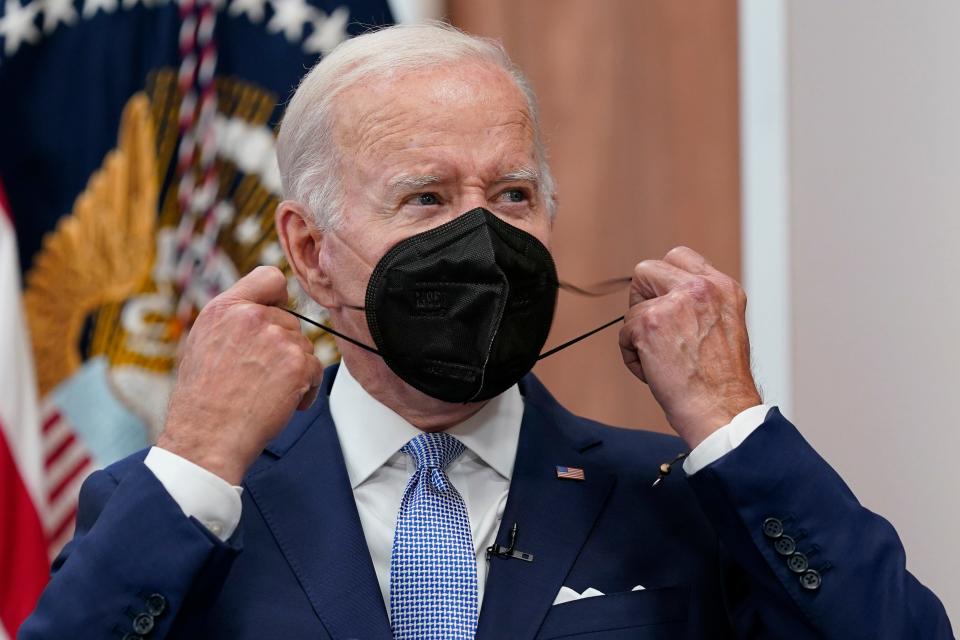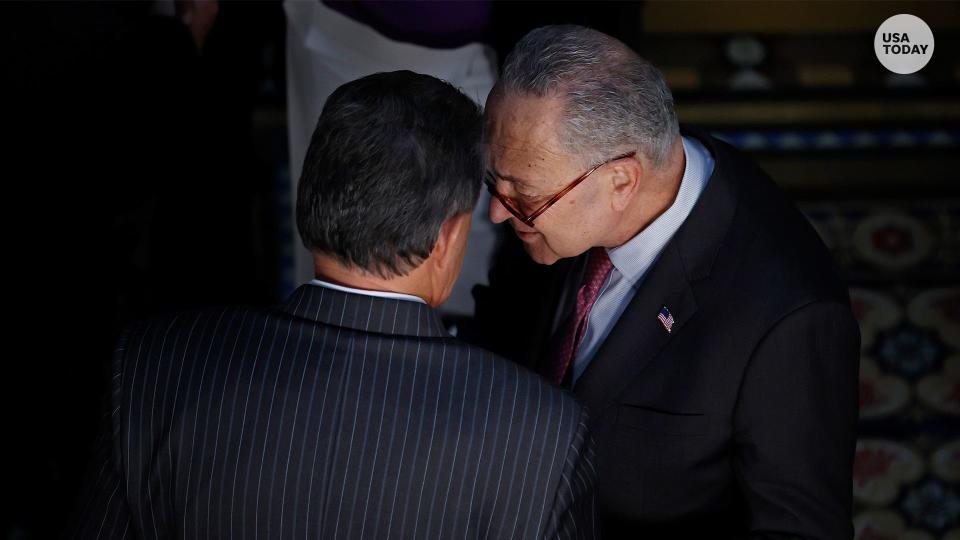Biden gets COVID, Congress pushes inflation package: Washington news you missed in July
- Oops!Something went wrong.Please try again later.
- Oops!Something went wrong.Please try again later.
It certainly hasn't been a sleepy summer in Washington.
After a historic, jam-packed month in June that saw the overturning of Roe v. Wade, landmark gun reform and a series of Jan. 6 hearings, Julywas hardly slower, with big votes in and a tense summit in the Middle East for President Joe Biden.
Throughout July, much attention has been devoted to what’s to come in the fall. Congress breaks for the month of August as midterm election races heat up. Biden and former President Donald Trump are both making steps toward a potential 2024 presidential repeat race.
And beyond Washingtong, wildfires raged on the West Coast and a flood in Kentucky killed over two dozen people. Both disasters have prompted response in Washington, and bring greater immediacy to climate change plan working its way through Congress.
Here’s a look at what you missed in July:
President Joe Biden tests positive for COVID-19 – twice
Biden became the second president to test positive for COVID-19 while in office. He tested positive July 21 after having a runny nose, fatigue and dry cough the night before, his doctor said. Biden is fully vaccinated and has received two booster shots. He was treated with the at-home antiviral medication Paxlovid, used for patients at higher risk for severe illness from COVID-19.
Biden's positive test came at a time when positivity rates are once again surging, thanks to a new variant known as BA.5. It's a reminder that more than two years into the pandemic, even as hospitalizations and deaths have quelled, that the pandemic lingers on.
More: BA.5 makes up nearly 80% of new COVID-19 cases. Here's what to know about the subvariant
It's unknown where Biden got COVID.
"I don't think that matters," White House Press Secretary Karine Jean-Pierre told reporters on July 21. "What matters is we prepared for this moment."
Biden tested negative on July 26 and went back to work in the Oval Office the following day. He once again tested positive on July 30.
The "rebound" COVID positivity happens sometimes with patients treated with Paxlovid. He had no reported symptoms but returned to isolation.
Cascade of crises: Unexpected events test Joe Biden's leadership, popularity

Jan. 6 hearings conclude ... for now
Ending in prime-time on July 21, and full of dramatic details like speech outtakes, denials from Trump that he lost the election, and phone calls from Secret Service agents fearing for their lives, the last Jan. 6 committee hearing felt more like the season finale to an eight-part television series then a government hearing.
And like most prime-time television finales, we were left with a teaser for more.
Rep. Liz Cheney, R-Wyo., said that as more witnesses came forward in video and public testimony, more agreed to meet with the committee and new evidence came to light.
"The dam has begun to break," she said.
The final hearing centered on what Trump did – and what he didn't do – during the 187 minutes between his rally speech at the Ellipse and the video he posted to Twitter telling rioters to go home.
Hearings are expected to pick back up in September. This fall the committee plans to publish a full report of its findings and recommendations. The Department of Justice has not yet announced whether it'll be conducting an investigation into Trump over Jan. 6.
At the same time, a USA TODAY/Suffolk University poll this month found that few people's minds have been changed by the hearings' findings.
What happens next: Jan. 6 committee promises more hearings this fall. What we know (and don't) about what happens next
What law enforcement told the committee: 'Jan. 6 ain't over': Capitol Police injured by rioters front and center for hearings
Biden navigates tense trip to Israel, Saudia Arabia
It was the fist bump heard 'round the world.
Biden greeted Saudi Crown Prince Mohammed bin Salman on July 15 in the country he once vowed to make a "pariah." American political leaders have criticized the crown prince over his human rights record, particularly over the 2018 killing of Washington Post columnist Jamal Khashoggi.
Defending the visit, Biden said his view on the killing of Khashoggi is "absolutely clear" and that he has "never been quiet" on human rights.
This was Biden's first trip to the Middle East, and he began in Israel – America's closest ally in the region. During his visit he focused on what Israel and the U.S. together could do to stand up to Iran's growing nuclear threat in the region.
Biden also met with Middle Eastern leaders in the Gulf Cooperation Council plus Egypt, Iraq and Jordan, known as the GCC+3.
More: Supporters of Palestinians in U.S. see little hope for peace progress with Biden's Middle East visit

Chips, reconciliation and more on the Hill
With the House and Senate set for August recess, July was the last opportunity for congressional Democrats to pass landmark legislation ahead of midterm campaigning – and an expected loss for Democrats in the House.
The Senate is still in session for a week, and has yet to vote on a wide-ranging plan negotiated by Majority Leader Chuck Schumer, D-N.Y., and Sen. Joe Manchin, D-W.Va., that would fulfill some goals of Biden's domestic agenda, like allowing Medicare to negotiate prescription drug prices and investing in clean energy transmission.
The measure would also cut the deficit by $300 billion over the next decade by ramping up IRS enforcement and closing some tax loopholes.
The plan has been dead in the water multiple times up until the last week of July. Many of the policies under Biden's original Build Back Better plan, like universal preschool and child tax credits, were nixed by Manchin and moderate Kyrsten Sinema, D-Ariz. It's still unclear whether Sinema will support the plan.
Not a new tax, a 'loophole': Joe Manchin says Inflation Reduction Act closes tax loophole and won't raise inflation
Inflation Reduction Act: Advocates praise Schumer-Manchin climate deal, despite a possible short-term bump in oil, gas leases
In the last week of July, Congress passed a bipartisan bill to boost the domestic manufacturing of computer chips, with roughly $52 billion in incentives for the semiconductor industry. Supporters say the investment will help avoid future supply change shortages.
Some Republicans said they couldn't support the bill out of retaliation for the Schumer-Manchin reconciliation agreement. But with a 64-33 vote in the Senate and 243-187 vote in the House, those Republicans were in the minority.

House responds to abortion, gun control, but Senate unlikely to pass
Following the overturning of Roe v. Wade by the Supreme Court in June, House Democrats have put forward protections for abortion and other rights threatened by the Dobbs decision, but these bills have little chance of being put forward for a vote before the Senate breaks for recess in early August. Even if the Senate votes, it's unlikely for these measures to get the Republican votes necessary to reach the 60-vote threshold.
The House voted on July 15 to protect the right to travel across state lines for abortion services and to guarantee abortion access until fetal viability, considered around 24 weeks.
Reps. Carolyn Maloney, D-N.Y., and Suzanne Bonamici, D-Ore., along with Sen. Elizabeth Warren, D-Mass., introduced legislation to crack down on false advertising related to abortion services at crisis pregnancy centers.
Supreme Court Justice Clarence Thomas also indicated in a concurring opinion in the Dobbs case that the court could in the future revisit protections for birth control and gay marriage. In response, the House voted to codify birth control access and same-sex marriage, both largely along party lines.
More: Post-Roe, what does it mean to be anti-abortion? GOP split on what's next
The House also took steps to prevent gun violence, following bipartisan legislation that beefs up background checks on young buyers, provides more money for school security and mental health services, incentivizes "red flag" laws, and clamps down on domestic assaults by closing the so-called "boyfriend loophole."
Many Democrats said last month's legislation didn't go far enough. Two House bills on gun control intend to close some gaps but have yet to go through the Senate: a bill to create an active shooter alert system and a bill to ban assault weapons.

On the horizon: primary elections and 2024 presidential bids
While only Maryland went to the polls this month in its primary election, 16 states will head to the polls in August ahead of the November general election.
But even with midterms around the corner, attention is only growing toward 2024.
Trump hasn't officially announced he'll be running, but allies say he'll announce as early as this summer, even as House Minority Leader Kevin McCarthy, R-Calif., urged him to hold off until after midterms.
While a Biden-Trump race looks more likely for 2024, most American don't want either to run. A USA TODAY/Suffolk University poll this month showed that 65% of voters, including half of Democrats, don't want Biden to run again. 68% of voters, and a third of Republicans, don't want to see Trump run again.
Trump and Pence made same-day appearances twice this month, first in Arizona to campaign for opposing candidates in the Republican gubernatorial primary, which will be held Aug. 2. Trump supports conservative Kari Lake, while Pence and Gov. Doug Ducey have backed businesswoman Karrin Taylor Robson.
The two also appeared in D.C. on July 26, giving dueling speeches in what was Trump's first appearance in Washington since leaving the White House. The two presented competing messages for the future of the GOP, with Pence offering veiled messages toward Trump, saying that "we always right the ship when our leaders veer off course." At the same time, however, Pence said he "couldn't be more proud of the record of the Trump-Pence administration."
Pence's remarks, along with the announcement of an autobiography set to come out this fall, all raise questions about whether Pence would run in 2024.
2024: For Mike Pence, problems with a White House run start with his old boss, Donald Trump
Finally, a new view of the galaxy
While separate from the world of Washington – 1.5 million kilometers to be exact – the James Webb Telescope stunned Americans across the country as the White House and NASA published its first images this month, showing thousands of galaxies.
“It is a new window into the history of our universe,” Biden said. “Today we’re getting a glimpse of the first light to shine through that window.”
This article originally appeared on USA TODAY: From Jan. 6 to Biden to climate change: Here's what you missed in July

